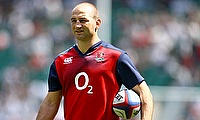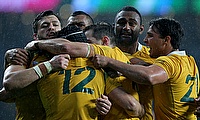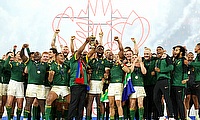How the success of the Lionesses can help the Red Roses and women's rugby go to the next level
Some of the most memorable moments in sport are often captured by one iconic image.
There are so many to choose from. Muhammad Ali standing over Sonny Liston in 1965, England captain Bobby Moore sitting on the shoulders of his teammates in 1966, Jonny Wilkinson’s World Cup winning drop-goal in 2003. The list goes on.
Taking pride of place amongst these historic events will be Chloe Kelly’s celebration after her winning goal for England in Sunday’s European Championship final.
Waving her shirt around her head in front of a packed-out Wembley Stadium, it is a picture which will live long in the memory and its importance to women’s football in this country will be hugely significant.
England’s 2-1 win over Germany will change how women’s football is viewed, but looking further afield, the impact of the tournament both on the pitch and in the stands could transcend across other sports, with rugby union potentially well-placed to capitalise on the euphoria of the last few weeks.
“They [the Lionesses] have completely caught the hearts and minds of the nation and that has a bigger responsibility,” England World Cup winner Rachael Burford tells TRU.
“The fact that a young girl has watched that game at the weekend for maybe the first time and that is now all she knows, that is the game changer part. The generation coming through now, it is normal to have sold-out crowds, it is normal for them to want to go to the shop and buy Leah Williamson's shirt with her name and her number on the back and I think this could be the catalyst for other sports.
“To witness what it did at the weekend and to know we have been inspired to follow their journey and what could be achievable for women's sport in general is remarkable.”
The Red Roses have had a slice of that admiration, especially over the last three years. Impressive attendances for home internationals – including record crowds in this year’s Six Nations against Wales and then Ireland – highlights the progress of the women’s game.
With a World Cup on the horizon in New Zealand, you get the sense rugby union can use the feel-good factor generated by the Lionesses to their advantage combined with the upward trajectory of the Red Roses.
“I think we will be focusing on what we are doing, but I don't think you can underestimate the impact other sports can have as a whole,” says current England international Amber Reed.
“When you see another national team doing well, you want to celebrate in that success. You can inspire each other and definitely watching the Lionesses over the last few weeks and what they've achieved has inspired me. We can take a lot from that to want to emulate the success that they have had.
“Yes, we are in our own bubble, but the impact the Lionesses have had across the nation, including us as Red Roses, is awesome.”
Whether it is Reed and her teammates currently in camp preparing for a World Cup or it is in a PE lesson, Burford feels the Lionesses’ landmark achievement can break down equality barriers that still exist across sport.
The Harlequins star is also the founder of Girls Rugby Club and believes questioning whether women should play football or rugby, for example, in schools or at grassroots level is no longer an option.
“The other thing around 'game changer' is how can anybody now deny young girls playing football at school? How can they turn around and say, 'You are going to play netball?' 'You don't get the option to play football.'
“You are going to have young girls now who want to play football. Questions start to get asked now more and more and actually, the answers aren't acceptable. They never were and even more so now.
"Ian Wright said if we aren't allowing young girls to play at school, then what are we doing? What is all of this about? He hit the nail on the head with it.
“It is the same with rugby. Girls don't get the opportunity. My argument has always been if you are offering rugby or if it is football to boys at your school, you have to provide the same equal opportunity to a young girl.
“It might only be three girls who want to do it one year. Then the next year it is suddenly six and the next year it is 12 and that is how you grow a legacy. In a way, we are grateful for what the Lionesses have done because I don't think denying kids the opportunity to play football or rugby or any sport will be tolerated anymore.”
Burford and Reed are just two of many names who have helped push and transform the Red Roses to where they find themselves today. The former was part of England’s last home World Cup in 2010 whilst both featured in 2014 in France where they went one better to claim the biggest prize in the sport.
Eight years ago, England were still an amateur side but their professionalism and determination to succeed shone through. Some of the team had to take unpaid leave from jobs but as Burford says, “all they cared about was playing rugby.”
Professional contracts were introduced for England’s XVs players before the 2017 World Cup then subsequently withdrawn but two years later, 28 players received full-time deals from the RFU.
Since then, England haven’t looked back. They have lost just one of their last 32 matches - collecting four successive Six Nations titles in the process - and Reed says the hard work and dedication of those that came even before 2014 must always be remembered.
“I really appreciate everything that I have got now. I am not willing to settle for what we have got because I think we still need to grow and keep pushing for future generations and it is important we don't stand still, but also I think at 2014, a lot of foundations were put in place. For every year since in the women's game, there has been huge growth.
“We wouldn't be here without the absolute pioneers of women's rugby and the first England squad who organised the first World Cup themselves and funded it themselves and all the teams that came over. The likes of Carol Isherwood and Gill Burns, all of those women who really put everything on the line to get it started, to really drive it and who are continuing to work with England Rugby, to work with World Rugby, to make it better to this day.
“The Lionesses would have had to go through the same. That success on Sunday, our success in 2014 is down to all of those past players and past staff members who have laid that legacy, laid that foundation.”
As Reed touches on, that unwavering commitment to the cause from everyone associated with the Lionesses has helped them reach the highest of heights, and the coverage of the tournament and their success is something the Red Roses will want a piece of when they touch down in New Zealand.
Burford recalls going on to BBC Breakfast after England's triumph in 2014: “We stayed over in a hotel, went there the next day and it was great but that was it. At the time, it felt like, 'wow, we are getting loads of exposure' whereas now, you have platforms which capture everything and everything is at the forefront.”
The Lionesses’ historic victory on Sunday was certainly front and centre. The game drew in a record peak audience of 17.5million on BBC One and was the most viewed programme in the UK so far this year. Even England’s semi-final win over Sweden saw 9.3million people tune in.
In terms of the Red Roses, their home internationals and the Women’s Six Nations are becoming increasingly more accessible to watch via the BBC and with the World Cup being shown on ITV, Burford is hoping the free-to-air coverage - combined with the world of social media - can create a similar enthusiasm to what the Lionesses experienced.
“There is probably a bit of concern around because the World Cup is on the other side of the world,” Burford adds. “The coverage, in general, is going to need to be really thought out because actually throughout the day, even though New Zealand is asleep, the audience here needs to be completely engrossed with the Red Roses. It is all about following the journey.
“The coverage will be on ITV and some people may say it is not great timing and yes we would have loved to have it on at prime time, but what audiences are you going to catch early in the morning? It could be young girls, young children who turn on the TV before school and that is great.
“We saw with the Lionesses, when you get momentum and you get traction and you get the coverage you deserve, it is almost unavoidable. You knew about it in some shape or form and naturally, you are going to create new audiences, draw people in so fingers crossed the Red Roses can do the same.”
As with the Lionesses, the Red Roses are one of the hot favourites to win the big prize in New Zealand and considering they are also the No.1 ranked team in the world, that should be enough encouragement to turn heads.
Reed admits the way the Lionesses captivated the nation was a “by-product” of how they conducted themselves both on and off the pitch and any admiration which comes the way of Simon Middleton’s side over the next few months will be down to their own “hard work”.
And looking at the bigger picture, any plaudits they do receive will also only help increase the popularity of the sport ahead of a home World Cup in 2025.
Of course Reed and the rest of the England training squad - who are based at Pennyhill Park for the next few weeks - will be purely focused on achieving glory in New Zealand but the RFU’s ambitions to make the tournament in three years time the best-attended Women’s World Cup in history has only been galvanised by the Lionesses and the Euros.
The RFU have outlined their desire to sell-out Twickenham for the final and when you look at the immediate future for the Red Roses, and for the women’s game in general, the only way appears to be up.
“I don’t think it will happen, but I hope we see that [a Twickenham sell-out] before 2025,” Burford says. “I probably wouldn't have said that before the Euros and witnessing what England football have been able to do.
“We had record crowds, record viewing figures for the Six Nations so what we could do on a global scale and how we can build on that is at our fingertips. What the Lionesses have done has unlocked the potential for sponsors, commercial opportunities and broadcasters who will all be looking in and licking their lips thinking where can they get in here, where can they get ahead of the game and where can they lay those foundations because I do think the product is there ready.
“The Red Roses are packaged up beautifully, got a bow on top and they are ready to go. We know 2025 is happening. The way England are playing, the World Cup, the launch of WXV, everything is stacking up in a way to just elevate it.”
“I think the 2010 World Cup was a massive point in the women's game when it was first in England,” Reed adds. “That tournament as a whole in terms of growing the game and getting numbers and inspiring people, it was huge.
“I was still pretty young and in my early days of playing XV-a-side rugby so actually for me to go and watch those girls, I knew some of them from club, but to see them in that environment playing for England and to be lucky enough to call them friends now, inspired me to want to be in that position.
“I think from 2010, we have moved the game on a lot so the way the Allianz Premier 15s is growing as well as rugby in this country and how well it is supported, I think 2025 is going to be a pretty special tournament.”
Since Sunday's Euro 2022 final, the RFU have said there has been "an average increase of over 100%" in ticket sales for both of England’s two September internationals against the USA and Wales which highlights the emerging parallels between the Lionesses and the Red Roses.
The success and silverware is of course the pinnacle for both teans but the work behind the scenes to grow the game doesn’t stop.
With the World Cup beginning in just 35 days, emulating what the Lionesses achieved could be the catalyst to take women’s rugby in England to the next level.

.jpg)






